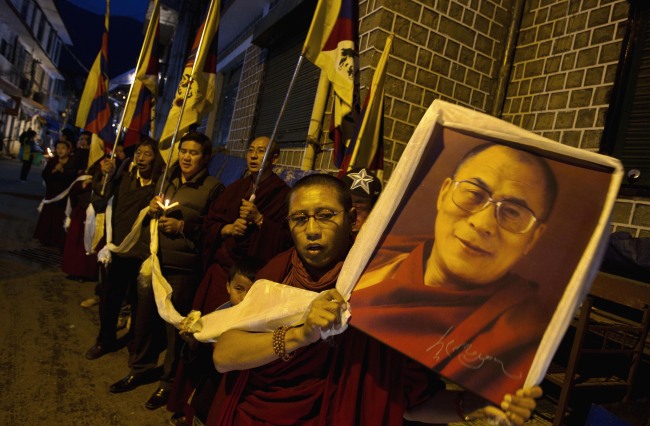[Newsmaker] Tibetan unrest in shadow of leaders’ meeting in Beijing
By Korea HeraldPublished : Nov. 13, 2012 - 20:12

As the eyes of the world focused on the once-in-a-decade change of power in Beijing last week, a story of bitter protest against Chinese rule played out in the country to considerably less attention.
Nine Tibetans set themselves on fire in the span of a week, with the latest case reported to have taken place on Monday. The protestor, a 20-year-old man in a village in the county of Tongren in northwest China’s Qinghai province, later died from his injuries. The deaths, along with rallies for greater Tibetan autonomy, coincided with the Chinese Communist Party’s 18th Party Congress to pick the country’s new leadership, which is due to finish on Wednesday. There have been a reported 72 self-immolations by Tibetans since 2009.
Tibet’s spiritual leader, the Dalai Lama, and its government in exile want greater autonomy for what China calls the Tibetan Autonomous Region, which has been under Chinese control since a 1949 invasion. They and their supporters abroad say that their political and religious rights have been savagely restricted on Beijing’s watch. The Chinese government, however, claims to have exercised sovereignty over the region for more than 700 years, and touts its invasion as having liberated Tibetans from feudal serfdom and theocracy. It brands the Dalai Lama, who fled to India in 1959 following a failed uprising against Chinese rule, a separatist and instigator of violence.
Territorial disputes are rarely black and white, and it is true that China has a long history of involvement in the region. Pre-invasion Tibet was no paradise, either: serfdom, illiteracy and brutal punishments for criminals were a matter of course.
It is the Tibetan side of the dispute, however, that has overwhelmingly garnered sympathy outside of China. Indeed, the cause to “free Tibet” has long been trendy in celebrity and activist circles. This, ironically, may hurt the cause more than help it, putting off those wary off faddish, feel-good campaigns. Nevertheless, there is no disputing the Chinese government’s awful record on human rights in the region and elsewhere.
Organizations including the United Nations, Amnesty International and the U.S. State Department have all identified Chinese human rights abuses in Tibet, ranging from arbitrary detention and forced abortions to restrictions on freedom of speech and the press. Whatever Tibet’s future, there can be no excuse for such inhumane actions.
By John Power (john.power@heraldcorp.com)
Nine Tibetans set themselves on fire in the span of a week, with the latest case reported to have taken place on Monday. The protestor, a 20-year-old man in a village in the county of Tongren in northwest China’s Qinghai province, later died from his injuries. The deaths, along with rallies for greater Tibetan autonomy, coincided with the Chinese Communist Party’s 18th Party Congress to pick the country’s new leadership, which is due to finish on Wednesday. There have been a reported 72 self-immolations by Tibetans since 2009.
Tibet’s spiritual leader, the Dalai Lama, and its government in exile want greater autonomy for what China calls the Tibetan Autonomous Region, which has been under Chinese control since a 1949 invasion. They and their supporters abroad say that their political and religious rights have been savagely restricted on Beijing’s watch. The Chinese government, however, claims to have exercised sovereignty over the region for more than 700 years, and touts its invasion as having liberated Tibetans from feudal serfdom and theocracy. It brands the Dalai Lama, who fled to India in 1959 following a failed uprising against Chinese rule, a separatist and instigator of violence.
Territorial disputes are rarely black and white, and it is true that China has a long history of involvement in the region. Pre-invasion Tibet was no paradise, either: serfdom, illiteracy and brutal punishments for criminals were a matter of course.
It is the Tibetan side of the dispute, however, that has overwhelmingly garnered sympathy outside of China. Indeed, the cause to “free Tibet” has long been trendy in celebrity and activist circles. This, ironically, may hurt the cause more than help it, putting off those wary off faddish, feel-good campaigns. Nevertheless, there is no disputing the Chinese government’s awful record on human rights in the region and elsewhere.
Organizations including the United Nations, Amnesty International and the U.S. State Department have all identified Chinese human rights abuses in Tibet, ranging from arbitrary detention and forced abortions to restrictions on freedom of speech and the press. Whatever Tibet’s future, there can be no excuse for such inhumane actions.
By John Power (john.power@heraldcorp.com)
-
Articles by Korea Herald







![[Graphic News] More Koreans say they plan long-distance trips this year](http://res.heraldm.com/phpwas/restmb_idxmake.php?idx=644&simg=/content/image/2024/04/17/20240417050828_0.gif&u=)
![[KH Explains] Hyundai's full hybrid edge to pay off amid slow transition to pure EVs](http://res.heraldm.com/phpwas/restmb_idxmake.php?idx=644&simg=/content/image/2024/04/18/20240418050645_0.jpg&u=20240419100350)






![[From the Scene] Monks, Buddhists hail return of remains of Buddhas](http://res.heraldm.com/phpwas/restmb_idxmake.php?idx=652&simg=/content/image/2024/04/19/20240419050617_0.jpg&u=20240419175937)

![[KH Explains] Hyundai's full hybrid edge to pay off amid slow transition to pure EVs](http://res.heraldm.com/phpwas/restmb_idxmake.php?idx=652&simg=/content/image/2024/04/18/20240418050645_0.jpg&u=20240419100350)

![[Today’s K-pop] Illit drops debut single remix](http://res.heraldm.com/phpwas/restmb_idxmake.php?idx=642&simg=/content/image/2024/04/19/20240419050612_0.jpg&u=)